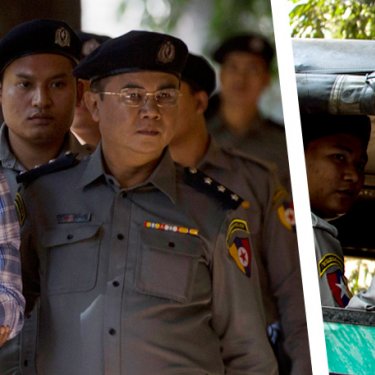Myanmar: RSF condemns illogical refusal to free Reuters reporters

Reporters Without Borders (RSF) condemns yesterday’s illogical decision by a Yangon judge to reject a defence request for the release of two Reuters journalists who have been held arbitrarily since 12 December, and calls on the international community to step up the pressure on Myanmar.
--------------------------------------------------------------------------------
Update
A police officer surprised a court today by saying Myanmar’s police set a trap for two Reuters journalists by giving them compromising documents. RSF hails the courage of Police Captain Moe Yan Naing in giving this testimony, which has finally shattered the walls of lies that the security services built around the case. The judge must now accept that he has no alternative but to free Wa Lone and Kyaw Soe Oo. There can be no legal grounds for another refusal to release them.
--------------------------------------------------------------------------------
The testimony of prosecution witnesses was “not without some basis,” the judge said feebly, evading the compelling argument for dismissing the case against the two journalists, Wa Lone and Kyaw Soe Oo, who are accused of violating Myanmar’s Official Secrets Act.
The two journalists are paying for the professionalism of their investigative reporting on a massacre of Rohingya civilians by soldiers last September in the village of Inn Dinn, during operations in northwestern Rakhine state that the UN has described as “ethnic cleansing” and as containing “elements of genocide.”
On the eve of yesterday’s hearing, the army issued a statement announcing that seven soldiers had been sentenced to ten years of hard labour for their actions in Inn Dinn in “participating in murder.”
“There is absolutely no legal consistency between the judge’s decision and the conviction of ten soldiers announced the day before,” said Daniel Bastard, the head of RSF’s Asia-Pacific desk. “Wa Lone and Kyaw Soe Oo are facing the possibility of 14 years in prison for their reporting on a story that military authorities themselves have effectively recognized as accurate.
“What with fabricated evidence, procedural violations and changing testimony, everything in this case has been a crude manipulation orchestrated by the security services. If the government led by Aung San Suu Kyi wants to recover any semblance of international credibility, it must clearly show its commitment to press freedom by allowing these two journalists to be freed.”
The UN, United States and European Union have all repeatedly called for the release of the two journalists. Bill Richardson, a veteran US diplomat who resigned in February from an international panel advising Suu Kyi’s government, said she became “furious” when he suggested freeing the two journalists.
Since last September, RSF has been pressing Suu Kyi about the press freedom violations in Myanmar resulting from the crisis that began in Rakhine state in August and prompted the flight of nearly 700,000 members of Myanmar’s Rohingya Muslim community to neighbouring Bangladesh.
The obstruction of journalists who have tried to cover this tragedy has been accompanied an enormous volume of violently anti-Muslim hate speech on Facebook. In March, UN human rights experts said Facebook had playing a “determining role” in fuelling the level of “dissension and conflict” in Myanmar.
Six Myanmar civil society organizations addressed an open letter to Facebook founder Mark Zuckerberg last week criticizing its failure to address “virulent hate speech” and “vicious rumours” despite their having been repeatedly reported to Facebook by these organizations.
The current situation in Myanmar is a clear illustration, if any were needed, of how censorship and disinformation can frustrate all efforts to steer a country to democracy.Myanmar is ranked 131st out of 180 countries in RSF's 2017 World Press Freedom Index.



